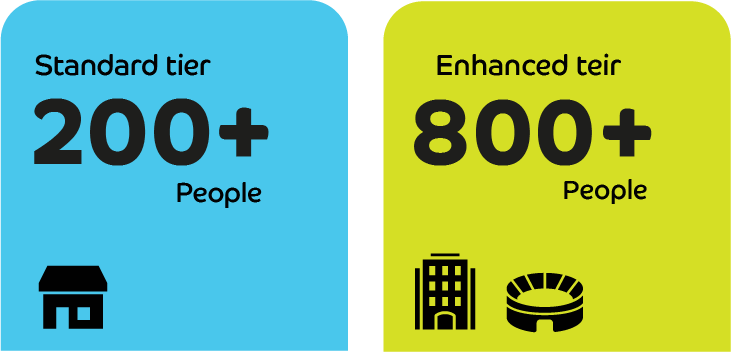Martyn’s Law, also known as the Protect Duty, is a proposed legislation in the United Kingdom aimed at enhancing public safety by requiring owners and operators of publicly accessible locations to take steps to protect people from terrorist attacks. It is named in honour of Martyn Hett, one of the victims of the 2017 Manchester Arena bombing.
Today, 12th September 2024, Martyn’s Law was laid before Parliament seven years after the Manchester suicide bombing.
The Terrorism (Protection of Premises) draft Bill, or Martyn’s Law, aimed at protecting people visiting venues against terrorist attacks following the Manchester Arena suicide bombing, has been laid before Parliament.
The mother of the man who the Bill is named after, Martyn Hett, said it is “one step closer to making public spaces safer”.
The public will be better protected from terrorism under new laws requiring many public venues to improve preparedness against attacks and implement measures to help keep people safe.
Home Secretary, Yvette Cooper, said:
Martyn’s Law has been a long time coming. I want to pay tribute to Figen Murray and her campaign team, who have tirelessly worked to make this happen. This legislation will strengthen public safety, help protect staff and the public from terrorism and ensure we learn the lessons from the terrible Manchester Arena attack and the inquiry that followed. It is important we now take this forward through Parliament in Martyn’s memory and to help keep people safe.
Figen Murray, mother of Martyn Hett, said:
I want to thank everyone who has played a part in getting the bill to this stage, and especially the Prime Minister, who gave me his word that he would act quickly to introduce Martyn’s Law. He said he would act quickly and he has. Today means we are one step closer to making public spaces safer for everyone. It is also hugely important for my family that Martyn’s Law will be on the statute book ahead of the next anniversary of Martyn’s death.
Head of Counter Terrorism Policing, Matt Jukes, said:
Through Martyn’s Law we can ensure that the public have additional protection from terrorist attacks while at events and public venues. Counter Terrorism Policing welcomes today’s bill and we look forward to seeing it progress through Parliament. We’re all inspired by and motivated by the experience of victims and survivors. Figen Murray has campaigned tirelessly for Martyn’s Law and it’s thanks to her unwavering determination that we are one step closer to ensuring the public has additional protection in the form of this legislation. We will continue to work with the public, with businesses, and with the government to ensure that when a terrorist attack takes place we have the right mitigations in place that will prevent other families from experiencing those tragedies.
The bill sets out the requirements that venues will need to undertake to help keep the public safe. A tiered approach will be ranked by venue size and capacity to ensure that smaller venues are not disproportionally burdened.

Standard Tier will be expected to do very simple yet effective activities such as training staff to lock doors, close shutters and know safe routes out of the venue.
The enhanced tier will will need to put in place measures such as CCTV or hiring security staff.
Following Royal Assent, businesses will be given time and support to understand and implement their new obligations and allow for the new regulator to be established.
FAQs
Why was Martyn’s Law introduced?
Martyn’s Law was introduced in response to the growing threat of terrorism and to ensure that venues are better prepared to respond to such incidents. It aims to establish a consistent and effective approach to security across a variety of public spaces, helping to prevent future attacks and minimize their impact.
What types of locations are affected by Martyn’s Law?
The law applies to a wide range of publicly accessible locations, including but not limited to:
- Concert halls and arenas
- Shopping centres
- Public squares and parks
- Sports stadiums
- Large entertainment venues
- Places of worship
- Educational institutions
Essentially, any place where large numbers of people gather and could potentially be targeted by terrorists.
What will be the key requirements of Martyn’s Law for venue operators?
Risk Assessment: Conducting thorough risk assessments to identify potential vulnerabilities and threats.
Mitigation Measures: Implementing appropriate and proportionate measures to reduce the risks identified, which may include physical security measures, staff training, and emergency response planning.
Training and Awareness: Ensuring that staff are adequately trained to recognize and respond to security threats.
Collaboration: Working with local authorities, emergency services, and other stakeholders to enhance overall security and preparedness.
Information Sharing: Sharing relevant security information and intelligence with appropriate authorities and other operators.
How will compliance with Martyn’s Law be monitored and enforced?
Compliance with Martyn’s Law will be monitored and enforced by designated regulatory bodies, which may include local authorities and other government agencies. These bodies will have the authority to conduct inspections, review risk assessments and mitigation plans, and take enforcement action if necessary, including issuing fines or other penalties for non-compliance.
When is Martyn’s Law expected to come into effect?
The exact timeline for the implementation of Martyn’s Law is still being determined, as it is subject to the legislative process. However, the UK government has expressed a strong commitment to moving forward with the legislation, and it is anticipated to be enacted in the near future.



